- Home
- Instruments
- Gear
- Recording
- Lessons
- Reviews
- Blog
From the Roland TR-808 to the AKAI MPC, drum machines have changed the way popular music is made. There is no one best drum machine; it's about finding the best one for your needs. Some producers like to build a track starting with a beat; some like to start with chords, and so on.
For that reason, a drum machine could be the center of your studio/live setup, or it could be something you bring in just to finish a track off. How you like to work as an artist/producer will help you understand what features are important to you in a drum machine.
What you expect from a drum machine should also give you an idea of what your budget should be. Just to give you a snapshot of how influential drum machines have been in popular music – the late, legendary J.Dilla's MPC is now displayed in the Smithsonian.
When you choose any piece of studio gear, it's ultimately about what it does for your sound. A drum machine is no different; some genres like EDM or hip hop rely more on programmed drums than real drummers. The other big reason for using a drum machine is the convenience; you might not have access to a real drummer every time you make a new track.
The cost of a drum machine depends entirely on what you need it to do and what you can afford. How much will it cost to get the right drum machine for you is the important question.
Here is what we think are the seven best drum machines available (2020). Our picks are in no particular order, but we highly recommend all seven; it just depends on what suits you best.
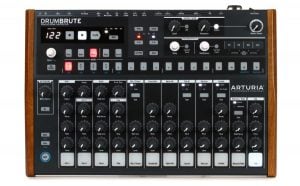
Arturia has been around for a long time, and they still seem slightly under-appreciated. They churn out some of the best MIDI controllers, synths, and drum machines available year after year.
The DrumBrute is a fully analog 12 track drum machine with 17 drum/percussion sounds. Each track has a velocity-sensitive pad for triggering sounds which are ideal for producers who are used to using an MPC or Maschine unit. Every track also has up to four parameter knobs for shaping the sound exactly as you want it.
At Arturia, they are masters of creating instruments that give the musician unparalleled control, and the DrumBrute is no exception. The combination of the 12 pads and abundance of parameter knobs makes it feel more like playing an instrument rather than just programming.
It's very hands-on, and that lets you get deeper into sequencing with amazing results. One of the standout features is a beautifully smooth Steiner Parker filter, unexpected on a machine at this price.
There are no built-in speakers here, but there's a headphone jack and a host of other outputs along with USB MIDI connectivity.
The DrumBrute is a beast, especially when you consider it comes in at under $500. We can't stress enough just how important workflow is to a producer; anything that improves yours is a blessing.
Not being able to automate parameters is a negative that could be frustrating, but it makes up for it elsewhere. The detail in which you can shape your sound is great, and the hands-on nature of the DrumBrute make it a joy to work with. A typically Arturia instrument.
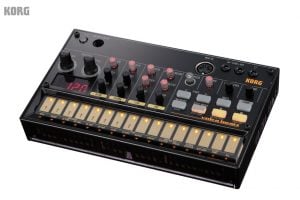
Korg‘s Volca Beats is a very popular drum machine, particularly amongst EDM and techno producers. It has an analog/PCM sound engine that is a clear nod to the legendary Roland TR-808. The Volca Beats, however, utilizes digital control, so you can record automation into the sequencer.
For example, if you have a loop going and you want to raise the pitch on a certain step then bring it back down, you can simply turn a knob, and the automation will be recorded.
The Volca Beats has six analog sounds and four PCM sounds. Its analog sounds are the kick, snare, hi-hats, and toms. The PCM samples are the clap, crash cymbal, agogo, and claves. Of course, you can layer analog sounds with PCM samples; for example, you could layer the analog snare with a PCM clap to get that extra snap. The Volca Beats has quite a wide appeal for such a small machine.
It's popular with EDM/techno producers as we mentioned, but it's also great for hip hop and other genres. The kick can sound fat for hip hop or clicky/glitchy for that minimal techno sound. It also doesn't get lost in a mix when used as a part of a larger composition; it cuts through nicely when you want it to.
The layout is nice and simple; each analog sound has an effects channel including pitch, decay, and other parameter knobs. Sounds are triggered using the multi-touch pads or step sequencer with a lovely step stutter function.
The Volca Beats can be battery-powered, which is awesome for making beats anywhere through the built-in speakers or headphones. Battery-powered does mean sacrificing in some areas; connectivity is lacking, but it's certainly a fair trade.
In terms of sound quality and functions, there are absolutely no complaints at under $200.
Korg seems to be leading a resurgence of old school drum machines, and we couldn't be happier. The Volca Beats is the best of the bunch in our opinion not least for its very reasonable price tag. It might be small, but it's built to last like most Korg gear, so it's perfect for producing or performing on the road. Great sounds, especially for you techno/EDM lovers out there, it's a steal at under $200.
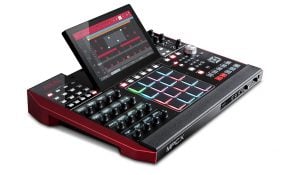
When it comes to production centers and groove boxes, AKAI Professional is best, and the MPC X is king of them all. AKAI's MPC range has a history spanning decades and countless hit records, especially in hip hop where no respected producer can say they have never used an MPC unit.
Any MPC is built around 16 drum pads, and no other drum machine or sampler has ever matched the feel and responsiveness of genuine MPC pads. Whether you are finger drumming, triggering samples, or sequencing, the pads are a joy to use. Sounds come primarily from genre themed expansion packs or samples that you record yourself.
The MPC X is also a very good audio/MIDI interface with lots of connectivity. You can plug your guitar, bass, microphone, etc. straight into the MPC X and record full tracks or cut it up into smaller samples.
The most noticeable thing on the MPC X is the 10″ adjustable multi-touch screen. Its touch interface has been developed by AKAI for the latest MPC's, and we have to say it's incredibly responsive and precise. The MPC X runs on its own OS powered by a multi-core processor with 2GB RAM and a 16GB internal drive (storage can be expanded).
AKAI's MPC 2.0 DAW is the heart of the system and works with the MPC X in either standalone mode or controller mode. There are advantages and disadvantages to both modes; for example, in standalone mode, you are limited to eight stereo tracks of audio. However, when in standalone mode, you don't need a computer and work entirely from the MPC X. In controller mode, you work with a computer but have a wider functionality within the MPC DAW.
In typical MPC fashion, the hardware layout is extremely user-friendly. The most impressive thing (other than the pads) is the 16 Q-Link knobs with individual OLED displays for visual feedback. Each knob is fully assignable, making life easier in the studio or as a live performance tool to accurately edit parameters on the fly.
If you are looking for a drum machine to build your studio around and you have the budget, this is the best drum machine for you. There is no other unit that can do so much; it's basically a portable recording set up and live performance powerhouse. We didn't even get into the CV connectivity for modular gear or integrating it with DAWs like Logic Pro as a VST; it offers too much for a short overview. Check it out!
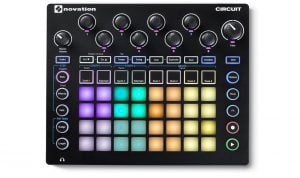
The Novation Circuit is probably better described as a groove box than a drum machine, and Novation is very good at making them. This is a standalone groove box or production box with two six-note polyphonic synthesizers and a four-part sampler.
Novation products are often looked on as being built for beginners because they are so user-friendly. Being user-friendly shouldn't be mistaken for being useless to more advanced musicians. The Circuit was somewhat limited when it first hit the shelves; it was a basic drum machine playing back stock sounds and no more.
Novation updated this through their Components app that lets users load new sample libraries (via USB) onto the Circuit, making it much more genre versatile.
Because the sounds are now so expansive, it's hit and miss, some good, some bad, but there's plenty of choices, so finding what you need is easy. The two digital synth engines are pretty impressive, especially for beatmakers and high-volume producers. Not only can you put your drums down, but you can sequence complete tracks making this an ideal, portable production hub. Everything is clear and easy to use; it encourages creativity rather than blocking it with complex controls.
We highly recommend the Novation Circuit to any beginner or producer who needs a fast workflow. The issue with sample manipulation is frustrating because you can't tweak a sound as much as you'd like to, which may make it feel less personal.
On the other hand, you have access to so many sounds that you can mix and match enough to create something unique every time. The fact you can create complete tracks in standalone mode or as a Controller adds to its value, well done Novation.
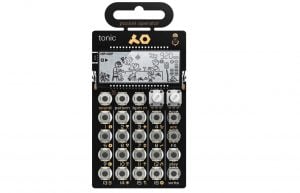
Teenage Engineering is the relatively new kid on the block in the world of synths and drum machines. Underneath the somewhat quirky and playful exterior, a lot is going on that should be taken seriously.
There are three pocket operators, the PO-12 Rhythm, PO-12 Office, and the PO-32 Tonic. We have picked out the PO-32 Tonic because it's far more versatile than the other two. Essentially, what you get is 16 sounds, 16 effects, and a 16 step sequencer wrapped in what looks like a homemade calculator.
What makes the PO-32 Tonic the most versatile is that you aren't limited to pre-programmed sounds. The sounds come from the Sonic Charge MicroTonic drum synth plugin, and you can upload more via the plugin. Upload may be an all too modern description because how the sounds are loaded onto your PO-32 Tonic is very old school.
A tiny microphone housed inside the PO-32 Tonic can be held next to a speaker or another Pocket Operator, recording and saving the new sounds. This also makes it easy to share your sound bank with another PO-32.
Despite MicroTonic being an older plug-in, the sounds are very good, ranging from booming kicks, cut through hi-hats, and snappy snares along with various other percussive sounds. Even heard through the built-in speakers, the sounds are very good.
The 16 sounds span bass-heavy kicks, fizzy white-noise hats, crunchy snares, and plenty of more esoteric, synthesized percussive sounds.
This isn't going to be your go-to drum machine by any means, but it's far from just being a gimmick. Yes, it's fun, it's quirky, it's cheap, but it offers ridiculous value for your money. As far as making beats on the go, it's barely bigger than a credit card, so it doesn't get any more portable.
While it won't replace a studio synth any time soon, it's something different that you will find yourself using on tracks for that reason alone. If there is any downside, it's that the small size makes it a little hard to get used to, but you'll have a lot of fun mastering it!
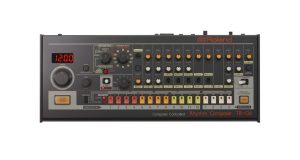
For many years, it seemed like if any record had electronic drums, they came from a Roland TR-808. Now the TR-08 is a modern, lower-priced, and some say a watered-down alternative to the legendary TR-808. But don't write it off, a lot has changed since the original was king, and this modern version has a lot to offer.
The biggest difference is that the TR-08 is a digital recreation of the analog classic, although it does share some programming similarities. Like most modern drum machines, you can now do things like creating random patterns which are always good if you have a creative block.
You can also add sub-step beats and apply swing to your pattern to humanize it a little – we literally take machines and make them try to sound more like a human drummer, sure to be some irony in there, but we love it.
The sounds are modeled on the TR-808; if you have ever produced music, you will know what an 808 kick sounds like. It was the foundation of every upbeat dance track for a long time and still is for many. The TR-08 has a 12-step sequencer with an extra 4 steps for intros and fills.
The layout is a little congested but easy to follow; each sound (kick, hi-hat, snare, clap, etc.) has a dedicated channel. Each channel has a level knob and any relative effect knobs, like decay, for example. Connectivity is decent for its size with trigger out, mix in, USB, and two 3.5mm analog outs (headphones).
The TR-08 sounds good; the question many will have is, does it sound authentic against the original? The short answer is yes it does; it sounds like a TR-808 with the bonus of some modern functions. However, like any reproduction or modeling synth, when sat next to the original, you purists out there will hear the difference. If you can source an original and get it for a decent price then, by all means, do so. Otherwise, the TR-08 is a drum machine worthy of being part of any studio setup.
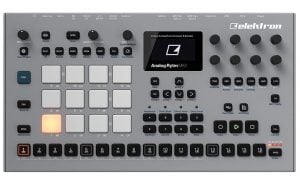
We are getting into the higher end of drum machines now with the Rytm MKII from Elektron. It comes with the same analog/digital, eight-voice sound engine that made its predecessor so sought after. It also has a 13-track sequencer just like the MKI version, each with a simple track selection button.
One thing that has thankfully changed is the size of the velocity-sensitive pads. They are now much larger and much more responsive, so you can now properly finger drum on the MKII.
The Rytm MKII works by assigning a machine (synth engine) to each pad/track, and there are nine machines to choose from. Each of these machines is capable of building specific drum sounds which can then be further tweaked when assigned.
The sound quality picks up where the MKI left off and improves upon it. There's more than enough low-end, nice clean, punchy mids, and highs that cut through perfectly. The most impressive thing is the clarity in the mid-range; many drum machines tend to get lost in a mix in this area, but the Rytm MKII is a step above most.
It isn't an overly complex front panel, but it does some complex things that take some understanding to get the most out of it. So, it's not a drum machine for beginners in any way which is confirmed by the under $2000 price range. Like most high-end machines, it comes with CV connectivity, so it can integrate with other modular gear, which we love.
The Rytm MKII is an absolute success. It takes the baton from the MKI and runs with it, very quickly! It's a pretty simple verdict on this one; if you are new to drum machines, you won't get the best out of this one. You also shouldn't pay so much money if you are a beginner; seek cheaper alternatives on our list.
However, if you are better versed in using drum machines or synths and have the cash to spare, this would be a very worthwhile investment indeed. It looks gorgeous, too, which is a secondary concern, but it certainly doesn't hurt.
We think every drum machine on our list has a lot to offer in the right context. That doesn't mean we think that any one of them will suit any musician, absolutely not. For most musicians, the budget is tight when it comes to building a studio (big or small), so buying smart is key.
Our first piece of advice is to apply common sense, don't assume the most expensive is always the best option.
Think about where it will be used; does it need to be extremely portable? If the answer is yes, then you most likely need something that can be battery powered with built-in speakers or a headphone in.
If you make music mostly at home or in the studio, then think about the practicalities. For example, how much space you have or how it will integrate with other equipment you use. You have to decide if it's something you want to use as a standalone instrument or if you want the option of chaining it with your other gear.
This means you have to look at the connectivity available on each drum machine and make sure it has what you need.
Something else you should consider is what your current equipment already does. What we mean by that is that if you have a synth like a KORG KingKORG, for example, do you need a drum machine that has onboard synths?
Apply these guidelines to make your own shortlist, and you won't go wrong!
Featured Image: Pixabay License, by Free-Photos, via Pixabay

Reader Interactions